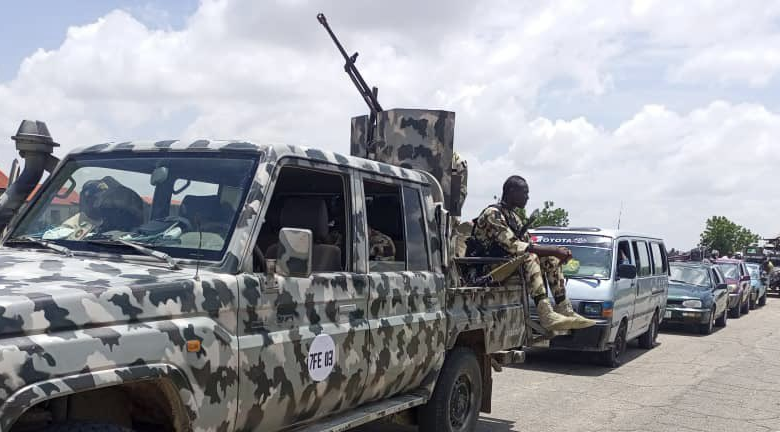Nigerian Military Discover Over 150 Improvised Explosives Along Highway In Northeast Nigeria
Soldiers in the region are facing uphill tasks of demining highways leading to recaptured communities. The highways are crucial for civilian movement and the relocation of displaced persons.

Counter insurgency forces supporting the return of internally displaced persons (IDP) to their communities have recovered over 150 landmines and Improvised Explosive Devices (IEDs) planted by insurgents in Nigeria’s northeastern state of Borno, according to the commander of the operation Major General Chris Musa.
According to the Army General, the biggest challenge in the ongoing return of IDPs and refugees to their respective communities is the safety of the routes and surrounding areas where the returnees are headed.
“We have recovered well over 150 IEDs in different parts of Borno state between March and July,” Adding that the IEDs recovered were capable of destroying a truck and ten men.
General Musa made the disclosure during the handing over of hospital equipment donated to the Army’s 7 Division hospital by the Northeast Development Commission (NEDC), saying the army needs more support to tackle the menace of IEDs.
Describing the risk posed by the IEDs and landmines on troops and civilians as enormous and can only be mitigated by paving routes and roads leading to the hinterlands. Paving the roads he says will “take away 65 per cent” of the challenges faced in the fight against the insurgents.
“What we feel will assist us in mitigating this challenge, and preventing further harm to our troops and the civil populace is road construction. When the roads are constructed, it will be difficult for the terrorists to come and plant IEDs on the road,” he said.
“Untarred roads also affected our troops’ movement because if we want to go for reinforcement it will be difficult for us to move through roads mined with IEDs; troops have to go on foot and begin to scan the width and breadth of the roads. You can imagine the time it would take if you have to do this for over a kilometre. It takes us the whole day if one is to go through the 85 km Maiduguri-Damboa road if troops are to scan for IEDs.”
Support Our Journalism
There are millions of ordinary people affected by conflict in Africa whose stories are missing in the mainstream media. HumAngle is determined to tell those challenging and under-reported stories, hoping that the people impacted by these conflicts will find the safety and security they deserve.
To ensure that we continue to provide public service coverage, we have a small favour to ask you. We want you to be part of our journalistic endeavour by contributing a token to us.
Your donation will further promote a robust, free, and independent media.
Donate HereStay Closer To The Stories That Matter




